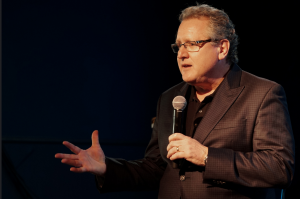By Mark Schaefer
Recently, my dear friend Kristen Daukas and I had an interesting exchange in the comment section about audience size and I thought it would be fun to blow it out into a blog post since it is such a relevant topic.
Kristen wrote:
“Content may be king but having a vast audience to accelerate the spread of the topic is queen and we know which one rules the castle. There have been several topics that I’ve written about that certainly have not gotten nearly the attention as a post of yours on the same topic. If you don’t have a vast audience to help spread your message for you, all the self-promoting in the world isn’t going to help.”
Well then. Does size matter?
In a {grow} first, I am actually going to answer the question and then prove myself wrong. You’ll just have to see for yourself.
Why size does not matter
One of my favorite case studies to illustrate the power of community is a family-owned bakery in Houston called Dessert Gallery. The business has a small but loyal Facebook following of less than 3,000 fans. However, a study by Rice University found that this audience was providing profound benefits to the bakery including:
- 36 percent more visits than non-Facebook customers
- 45 percent more of their dining budget spent at the bakery
- 33 percent spent more at the bakery than at other restaurants
- Greater emotional attachment to the brand
The owner successfully uses her Facebook page to gain marketing insight, address customer problems, communicate promotions, and get feedback on new product ideas.
This company does not have a huge Facebook following but the Likes they have MATTER.
Clearly, building a vast, global audience would simply be a waste of time for this business. As long as it attracts and retains loyal fans in its target business area, its small but mighty audience will be just fine.
So, in this case, growing a huge audience is not a priority. In fact it might even be a costly distraction for the business. Audience size is a function of strategy.
Why size does matter
I am now going to argue with myself. It happens.
In the online world the “social proof” of a large audience may be important because in our information-dense world, we’re starved for clues to help us determine leadership and authority. We readily look to “badges of influence” like number of Twitter followers or even Facebook likes to help us determine brand worthiness.
In some markets, there may even be a Facebook arms race as competing brands do anything necessary to gain the upper hand on this metric. I recently wrote a post describing a company who has an internal marketing metric of “cost per like.” On the surface, this seems ludicrous but it demonstrates how strategically important this symbol has become.
Icky. But true.
So in the bakery case study above, would this bakery be disadvantaged — ever so subtly — if the bakery down the street had 10,000 fans versus their 3,000? Hmmm.
Of course there are other reasons why size might matter if you are aiming for a global audience, and as Kristen said, you are actively trying to move content and build a personal brand. As long as the audience is relevant and real, bigger would be better.
So I hope I did not confuse you … but it’s a complicated subject. The bottom line is, start with strategy. Know who your customers are, where they get their information, and how you can be useful to them through your content. Then build appropriately.
What is your view?
 Mark Schaefer is the chief blogger for this site, executive director of Schaefer Marketing Solutions, and the author of several best-selling digital marketing books. He is an acclaimed keynote speaker, college educator, and business consultant. The Marketing Companion podcast is among the top business podcasts in the world. Contact Mark to have him speak to your company event or conference soon.
Mark Schaefer is the chief blogger for this site, executive director of Schaefer Marketing Solutions, and the author of several best-selling digital marketing books. He is an acclaimed keynote speaker, college educator, and business consultant. The Marketing Companion podcast is among the top business podcasts in the world. Contact Mark to have him speak to your company event or conference soon.



